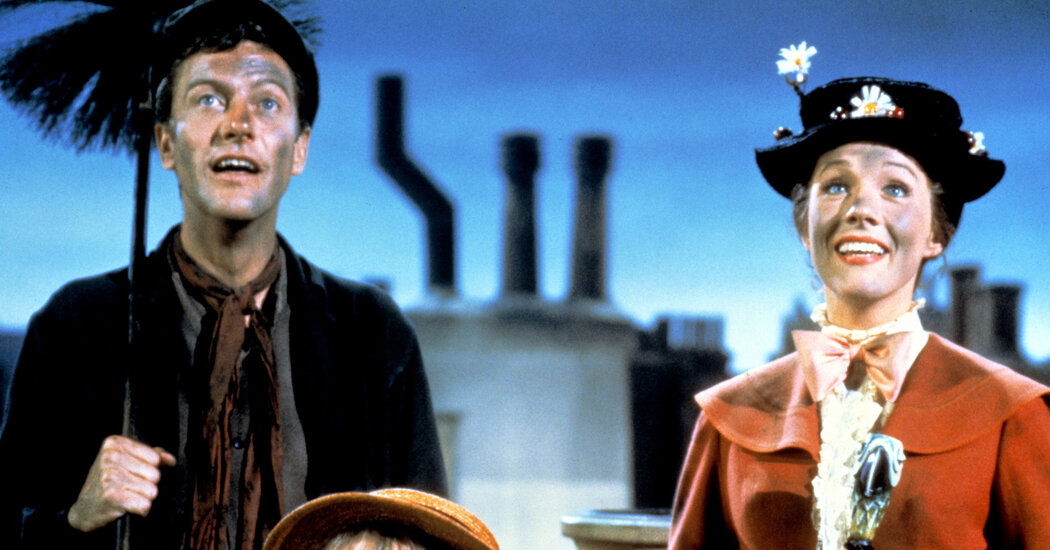The rating for “Mary Poppins,” the beloved children’s musical about a nanny with magical powers that was released 60 years ago, has been raised to PG in Britain because of the use of “discriminatory language,” the British Board of Film Classification said.
The rating change follows a wave of recontextualizing and reclassifying of films from bygone eras for modern audiences amid shifting cultural norms and mores.
“Mary Poppins” includes two uses of an offensive racial slur to describe an Indigenous group in South Africa. It is first heard when Admiral Boom asks Michael, a child, if he is going on an adventure to defeat said group. Admiral Boom repeats the slur during a chimney sweeps dance sequence when he shouts that he is being attacked. The dancing figures he spots in the distance are not Black Africans, but white dancers with blackened faces from soot.
The film was originally rated “U,” for Universal, upon its release in 1964, and again in 2013 for a theatrical release, the B.B.F.C. said in a statement. When it was resubmitted in February for another theatrical release, it was reclassified as PG.
PG is the second-least severe of six ratings in Britain. The strictest is 18, which prohibits anyone under that age from renting, buying or seeing the film in movie theaters.
“We understand from our racism and discrimination research, and recent classification guidelines research, that a key concern for people, parents in particular, is the potential to expose children to discriminatory language” or behavior which they may find distressing or repeat without realizing the potential offense, a spokeswoman for the board said in a statement.
Leshu Torchin, a senior lecturer of film studies at the University of St. Andrews in Scotland, said the rating change for “Mary Poppins” made sense, noting that the rating works as a guideline and does not prevent anyone from watching a film.
“It becomes a useful sort of instruction, particularly for people with children, to reflect on whether their own children are ready for these discussions, ready for a film, or very ready, but might feel inclined to want to talk afterward,” Dr. Torchin said.
Films do not stay static, she said. “As long as it’s going to be watched, it’s going to be watched by new audiences,” she said, adding that the rating makes parents aware “that children could watch a film, and if not with their parents to help contextualize things, could come away either thinking certain language is OK, or come away from it feeling harmed by what they’ve just seen.”
While the rating change for “Mary Poppins” came as a surprise to many, it is part of a growing list of films that have been reclassified and re-examined with fresh eyes in recent years.
The B.B.F.C. noted that in 2023 it reclassified “Santa Claus: The Movie” (1985) with a higher rating, to PG, for its mild violence and language. Similarly, the rating for “Star Wars: Episode VI — Return of the Jedi” (1983) was also raised to PG for moderate violence.
Film ratings can also move downward. “Enter the Dragon” (1973), “Friday the 13th” (1980) and several others are now labeled 15 after previously having higher ratings.
Similar re-evaluation has been going on in the United States in recent years. In 2020, HBO Max temporarily pulled “Gone with the Wind,” a film that is routinely criticized for whitewashing the horrors of slavery and romanticizing the antebellum South, from its streaming library. The decision came amid intense reflections in the United States over depictions of race and policing following nationwide protests over police brutality. HBO Max cited the need for “an explanation and a denouncement” of the movie’s depiction of race relations.
Past television series also came under scrutiny at the time, as certain episodes of “30 Rock,” “It’s Always Sunny in Philadelphia” and “Scrubs” were removed from streaming platforms for featuring white characters wearing blackface.
Similarly, Disney+ in 2021 added a content disclaimer to 18 episodes of “The Muppet Show” because they include “negative depictions and/or mistreatment of people or cultures.” The company said that instead of removing the content, it was acknowledging its harmful effects in hopes of sparking conversation about the issues.
Books, too, have been revised after renewed attention. The estate of Roald Dahl in 2023 changed or removed hundreds of words, including descriptions of characters’ appearances, races and genders, in at least 10 of the author’s children’s books, like “Charlie and the Chocolate Factory” and “Matilda,” to make them less offensive.


